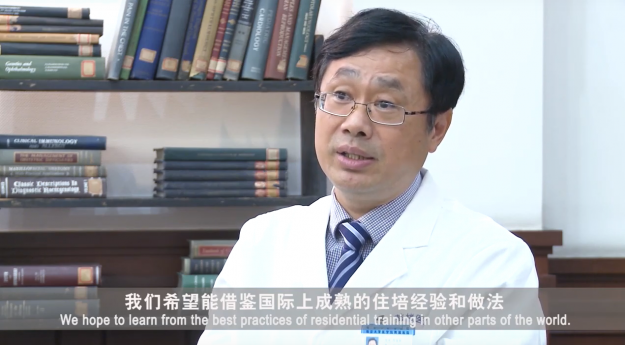Since 2016, Johns Hopkins Medicine International (JHI) has been working with Taikang Insurance Company, China’s largest non-state-owned insurance financial group. If that seems like an unusual partner for Johns Hopkins, Taikang has a dedicated arm that focuses on health care investments and businesses, including health and wellness products and services, continuing care retirement communities, hospitals and related property development projects in China.
Our colleagues at Taikang Life were interested in developing health care facilities, and they recognized that to deliver high-quality care, they needed a pipeline of well-trained residency graduates capable of independent practice.
And so we are working with Taikang as part of a three-way project to help Drum Tower Hospital in Nanjing, China, develop institutional educational infrastructure and competency-based milestones in residency training. The scope of our work includes providing on-site consulting, creating faculty development programs, developing online medical education modules and hosting observers from Drum Tower at Johns Hopkins.
I’m excited about this project because one of the things that attracted me to Hopkins — and that has kept me here for 30 years — is our medical training paradigm. It’s important to know that residency training in the United States originated at Johns Hopkins. William Osler started the first residency training in the 1890s, and Johns Hopkins has been the leader in specialty and subspecialty training in the United States ever since.
When I joined JHI, I realized how valuable it would be for us to share our methodologies and goals of training with our international affiliates. Medical education in the United States is competency based, which means that when young physician trainees finish their formal training — their residency — they are qualified and certified to practice as independent practitioners.
That is not the case throughout most of the rest of the world. Introducing this competency-based methodology of training was a way to enhance Chinese medical training. I was thrilled when our colleagues at Taikang Life and Drum Tower sought out our collaboration to incorporate this model to improve their already-outstanding training programs.
One of the other special characteristics of the U.S. training system is that all trainees — regardless of specialty — must accomplish specific milestones during their residency. That’s how we quantify and monitor their progress. This was another feature that our colleagues in China were enthusiastic to incorporate into their training programs. Our shared objective was to develop milestones and competencies so graduates of their medical residency program would be prepared to become expert clinicians in the future.
There’s nothing more rewarding than working with like-minded clinical educators and seeing young people develop into great practitioners. One of my goals as president of JHI is to develop collaborations so our colleagues throughout the world can develop outstanding educational and training programs, not only for physicians but also for the entire health care team.
I’m proud that over the course of this collaboration we’ve had many opportunities to visit Drum Tower Hospital in Nanjing, as well as to host the leading educators of their hospital at our hospital. Through these efforts, many educators, residents and trainees at Hopkins have met the Drum Tower educators and have created spirited relationships that will lead to a future of collaboration and improved education and training — spurring improved patient care — in both parts of the world. We believe our collaboration has established a sustainable reform of Drum Tower’s residency program and will start to fill the pipeline with additional qualified clinicians to care for China’s growing health needs.
